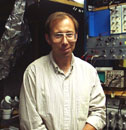|
Day 1
(Monday, July 23, 2007)
Nature of Science
(Hunt
Morgan Building, 215)
8:30 Welcome and introductions (Kandris)
8:45 Overview
of project (Carol, Brian and Kandris)
9:00 Discussion of role of laboratory
in science based on America's Lab Report (Carol)
9:30 Overview of nature of
science and generic examples of each theme (Teddie)
11:30 Project specific
examples of some themes TBD
12:00 Lunch
12:30 The nature of science compared
with other content areas (Ann)
12:30 Drosophila experiment showing many of
the themes, experimental design, and process
skills (Robin, Blake and Brian)
3:30 Debrief Drosophila experiment (Everyone)
4:00
Adjourn
5:00 -7:30 Reception Day
2 (Tuesday, July 24)
AM: (for crayfish based projects see www page: GO
TO)
PM: Day
3 (Wednesday, July 25)
AM: (for crayfish based projects see www page: GO
TO)
PM: Day
4 (Thursday, July 26)
Introduction
.... Agenda items
.... Literacy goals for the day
.... Read aloud Examining
assumptions about reading and writing in Science
.... What does reading and
writing in Science mean to you?
.... Discussion of four assumptions held by
content teachers
.... Working through the roadblocks for teachers Addressing
the first assumption
.... Text Sets
.... Digital Texts Sets
....
Accessible texts
.... Alternative Texts
Addressing
additional assumptions
.... Pre-Reading Strategies
.......... Anticipation
Guides
.......... KWL Charts
..........Tea Party
....
During Reading Strategies
.......... Say Something
.......... Bookmarks
....
After Reading Strategies
.......... Something Happened and Then
..........
Text Reformulation
.......... Sketch to Stretch
Lunch
Scientific
Notebook-Set Up, Use, Management and Assessment
Notebook Strategies-writing
to learn
.......... Fast Write
.......... Questioning the Scientist
..........
Drawing
.......... Observations
Interactive
Notebook-writing to learn
.......... New Info.
.......... Conclusions
..........
Questions
Reading
and Writing in Science-Management and Assessment
Reflection and Evaluation
July
27th AM Day 5: Mathematics Day
8:30 Welcome and introductions (Ann Bartosh)
8:45
12:00 Lunch
July
27th PM Day 5: Encouraging Girls in Science and Scheduling
1:00
Welcome and introductions (Sondra Floyd)
2:00 Scheduling for next year (Everyone)
3:30
Adjourn Closing
session- feed back from teachers. Go over where to obtain the goods they need
for their classrooms.
Present some standard ppt files that can be used by the
teachers for their classes. Burn CDs and distribute content folders. | 